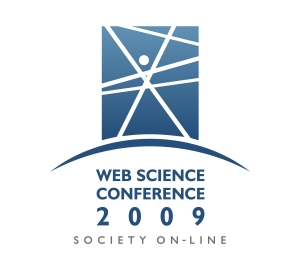Web Science Conference 2009 – Society On-Line
Αθήνα, Ελλάδα, 18-20 Μαρτίου 2009
Το ΠΡΩΤΟ ΠΑΓΚΟΣΜΙΟ συνέδριο ΓΙΑ ΤΗΝ ΕΠΙΣΤΗΜΗ ΤΟΥ WEB
Το Web Science Conference 2009 – Society On–Line είναι το πρώτο συνέδριο αφιερωμένο στην επιστημονική μελέτη των κοινωνικο-τεχνικών διαστάσεων του Web ως ένα μοναδικό και ολοκληρωμένο δημιούργημα. Η Επιστήμη του Web (Web Science) στοχεύει στην κατανόηση, στο σχεδιασμό και στην ανάπτυξη των τεχνολογιών και των εφαρμογών που συγκροτούν το World Wide Web. Ωστόσο, το Web δεν υπάρχει χωρίς τη συμμετοχή των ατόμων και των οργανισμών. Καθώς, λοιπόν, σήμερα ένα ιδιαίτερα σημαντικό μέρος της καθημερινής μας ζωής αφιερώνεται σε on–line δραστηριότητες, από ένα συνεχώς αυξανόμενο τμήμα του παγκόσμιου πληθυσμού, προκύπτει η αναγκαιότητα για την υλοποίηση του πρώτου συνεδρίου για την Επιστήμη του Web (Web Science), το οποίο διοργανώνεται από το Web Science Research Initiative (WSRI) και το Ίδρυμα Μείζονος Ελληνισμού (ΙΜΕ) και το οποίο είναι αφιερωμένο στην παρουσίαση της έρευνας για την Society On–Line. Οι εργασίες του συνεδρίου θα πραγματοποιηθούν από τις 18 έως τις 20 Μαρτίου 2009, στο Θέατρον του Ιδρύματος Μείζονος Ελληνισμού (Πειραιώς 254, Ταύρος, Αθήνα).
Οι θεματικές
Η πρωτοβουλία για την Επιστήμη του Web στοχεύει στην κατανόηση του αντίκτυπου των σύγχρονων τεχνολογιών της Πληροφορίας και του Διαδικτύου στο επιστημονικό πεδίο και στην καθημερινή πρακτική και, παράλληλα, επιθυμεί την παραγωγή επιστημονικής γνώσης για την περαιτέρω ανάπτυξη του World Wide Web. Από αυτή την άποψη, το Web Science Conference 2009 – Society On–Line προσεγγίζει, χωρίς να περιορίζεται σε αυτές, τις ακόλουθες θεματικές:
§ Culture On-Line
§ Networking (Social and Technical)
§ Cybercrime and/or the Prevention Thereof
§ Social Relationships
§ E-commerce
§ E-Learning
§ Government and Political Life
§ Health
§ Linked Data and the Semantic Web
§ Trust and Reputation
§ Security and Privacy
Τα ανοιχτά ερωτήματα
§ Ποιες μεθόδους θα πρέπει να χρησιμοποιήσουμε για να μελετήσουμε και να κατανοήσουμε τον τρόπο που λειτουργεί το Web ώστε να προβλέψουμε και να διασφαλίσουμε το μέλλον του;
§ Μπορούμε να διασφαλίσουμε ότι το Web είναι προσβάσιμο από και χρήσιμο για όλους, περιλαμβάνοντας τα άτομα με αναπηρίες, τα άτομα από διαφορετικές κουλτούρες, τα άτομα με γλωσσικές ή/και άλλες ιδιαιτερότητες, δηλαδή έναν πληθυσμό που εκτείνεται σε ολόκληρη την υφήλιο;
§ Πώς συμπεριφέρονται τα άτομα και οι οργανώσεις στο Διαδίκτυο – τι τους παρακινεί να κάνουν αγορές, να κλείσουν ραντεβού και συναντήσεις, να κάνουν φίλους, να εκπαιδευτούν, να συμμετάσχουν σε πολιτικές διαδικασίες, να χρησιμοποιήσουν οικονομικές ή υγειονομικές υπηρεσίες;
§ Ποιες διαδικτυακές εφαρμογές εμπιστεύονται άτομα και σε ποιους on–line φορείς απευθύνονται; Μπορεί το Διαδίκτυο να λειτουργήσει για όλους ως εργαλείο διασκέδασης, επικοινωνίας, συναλλαγής, αναπαράστασης και αναζήτησης γνώσης;
§ Είναι εφικτό να προωθήσουμε την ανάπτυξη τεχνολογικών κριτηρίων που να ενισχύουν τη δημιουργικότητα, τη συνεργασία, την επικοινωνία και τις συναλλαγές μεταξύ των ανθρώπων;
§ Με ποιους τρόπους μπορούμε να αυξήσουμε την ισχύ του Web προς την κατεύθυνση της ενδυνάμωσης των πληθυσμών που απολαμβάνουν υπηρεσίες χαμηλής ποιότητας, μέσα από την κατάλυση των περιορισμών της πρόσβασης σε ζωτικές υπηρεσίες;
§ Πώς μπορεί η «σκοτεινή» πλευρά του Web – πχ το κυβερνο-έγκλημα, η πορνογραφία και τα τρομοκρατικά δίκτυα – να κατανοηθεί και να ελεγχθεί χωρίς να υπονομεύει την εμπειρία των υπόλοιπων χρηστών;
§ Τέλος, πώς ο σχεδιασμός του Web του μέλλοντος να διασφαλίσει ότι ένα σύστημα πάνω στο οποίο στηρίζονται – όπως ο ίδιος ο Tim Berners–Lee έχει διατυπώσει – η δημοκρατία και το εμπόριο μπορεί να παραμείνει «σταθερό και ανθρώπινο»;
WWW Forum
Το WWW Forum είναι το εναρκτήριο γεγονός τουWeb Science Conference 2009 – Society On-Line. Κατά τη διάρκεια του WWW Forum, ο Tim Berners–Lee, Εφευρέτης του WWW και Κορυφαίος Agenda Setter και ο Ιωσήφ Σηφάκης, ο πρώτος Έλληνας που έλαβε το Βραβείο Turing, το 2007, θα συζητήσουν με το κοινό και με μία πλειάδα αναγνωρισμένων πολιτικών και επιστημόνων τα εξής σημαντικά ζητήματα:
§ Επιστήμη του Web και έρευνα
§ Τεχνολογία του Web και πρακτική
§ Το Web για την Κοινωνία



